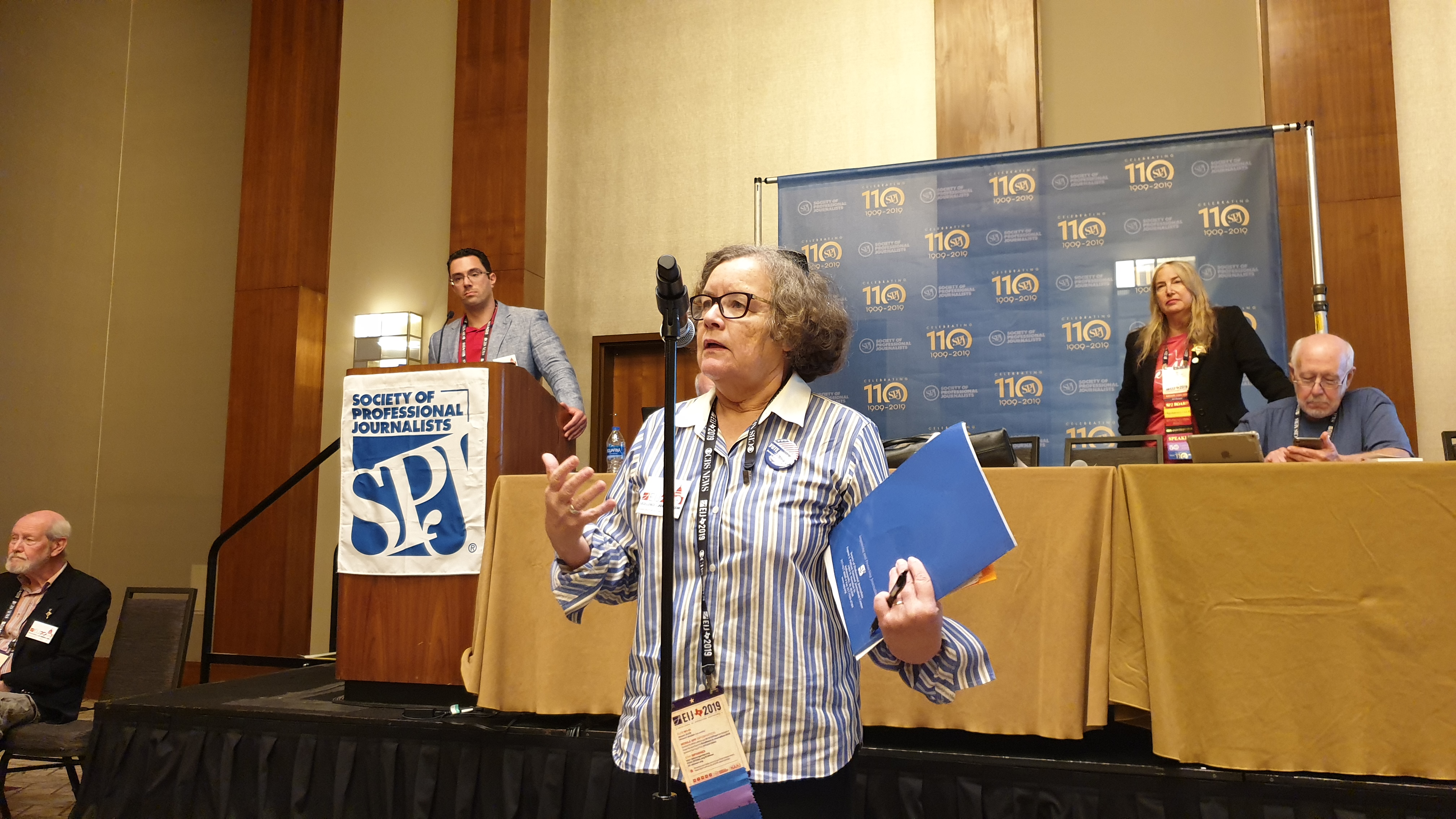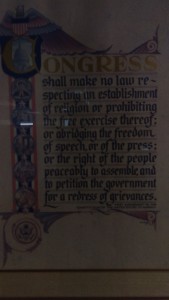
There are many organizations that help reporters with FOIA requests, records access
By Kathryn Foxhall
You can file your own Freedom of Information Act request and you can appeal a denial. However, a little knowledge of the law goes a long way, says Katie Townsend, legal director of the Reporters Committee for Freedom of the Press. It helps tremendously to know the law in your jurisdiction, she said.
Townsend and others in the EIJ19 session “Finding Allies in Your Public Records Fight – For Free” presented a long list of organizations that help reporters in fights for records.
She also announced the new, “Free Expression Legal Network,” which includes 22 public law school clinics as well as nonacademic practitioners, “focused on promoting and protecting free speech, free press and the free flow of information for an informed and engaged citizenry.”
They are all over the country and vary in their focus.
The RCFP is also starting a network of local legal services in 2020. Attorneys will be hired in up to five jurisdictions to do legal services for investigative journalism.
Both Townsend and David Cuillier, past SPJ president and a key expert on FOI work, said that “mandatory fee shifting,” available in some states, is critical. The phrase refers to laws that allow attorneys to collect legal fees if they win a FOIA appeal. Sometimes those fees can be quite substantial, Cuillier indicated. That can motivate attorneys to take such cases if they are confident they can win, so journalists (or any requesters) don’t have to pay legal fees or find a pro bono attorney.
The speakers also suggested that when records are denied, the requestor can ask for the agency’s emails or processing notes about the request to order to understand on why the request was denied.
Newly available is the useful second edition of, “The Art of Access, Strategies for Acquiring Public Records” by Cuillier and Charles N. Davis. If you order, be sure you are getting the second edition.
In addition, the RCFP Open Government Guide is available on their site.
~~~~~
Kathryn Foxhall wrote the text of RESOLUTION 2, which was passed by delegates at EIJ19:
Resolution No. 2
Allowing Federal Employees to Freely Talk with the Press
Submitted by: SPJ Freedom of Information Committee
Delegate Action: Approved
WHEREAS the ability of people to speak to each other normally, without being pressured to report conversations to the authorities or to anyone, is essential to public welfare and democracy;
WHEREAS the Society of Professional Journalists has carefully studied and repeatedly decried the cultural norm that has grown up in many arenas of prohibiting employees and others from communicating with journalists without going through or reporting to a public information officers or other authority;
WHEREAS the prohibitions against communicating with journalists and the pressures to report contacts are authoritarian and prevent source people from explaining many things that are the public’s business and certainly interlace with other current pressures on speech to weaken society and create extraordinarily dangerous situations;
WHEREAS in a democracy, it is more appropriate for the public and the press to have oversight over the communications of people in power rather than the reverse;
WHEREAS proposed compromises that would allow reporters to communicate with whom they wish, but would still force employees or others to report contacts are dangerously intimidating to communication;
WHEREAS proposed compromises that would allow people in power to mandate reporting of contacts after they occur are also dangerously intimidating to communication;
WHEREAS such compromises are insidious because they often empower journalists to gather some information while being unaware of how much the source people speaking under this censorship will not mention;
WHEREAS in spite of journalistic skills, triumphs, prowess, breakthroughs and impressive stories and in spite of the fact some sources do leak, journalists cannot know what they miss when people are under pressure to not communicate or pressure to report contacts with journalists;
WHEREAS journalists’ obligation to do all they can to seek the full truth includes fighting against barriers to understanding the full truth and reporting those barriers to the public;
WHEREAS the public has a right to be dubious about information coming from public or private organizations where employees are silenced in terms of communicating to the press or where they cannot speak without guards;
WHEREAS the SPJ stresses to people in public and private leadership that these restrictions routinely hide information from the leaders themselves; from the professionals and others who focus on the subjects being discussed; and from the rest of the public; and
WHEREAS Rep. Paul Tonko (D-NY) and Sen. Brian Schatz (D-HI) have introduced into Congress the Scientific Integrity Act (H.R. 1709 and S. 775) which has the intent of allowing federal scientists to speak to the media as well as publish scientific findings, participate in scientific organizations and communicate in other ways;
THEREFORE LET IT BE RESOLVED the Society of Professional Journalists, meeting in convention on September 7, 2019 in San Antonio, Texas calls on Rep. Tonko, Sen. Schatz and others in Congress to ensure any such legislation supports the right of unimpeded communication with journalists for all federal employees and not just for scientists;
LET IT BE FURTHER RESOLVED that any such legislation ensure that all federal employees have the right to communicate with the press without reporting contacts with the authorities or anyone, before or after the contacts; and that reporters making requests to an agency be able to speak to the requested persons and not be confined to spokespersons.
LET IT BE FURTHER RESOLVED that SPJ calls on Congress and the Executive Branch to complete a thorough examination on why free speech has become so undermined for millions of people that legislation is needed to allow free speech, without reporting to authorities and on what those restrictions do to the nation’s functioning.
LET IT BE FINALLY RESOLVED that SPJ calls on people in leadership in all arenas, including sports, education, police operations, state and local government, science and others, to work to eliminate these restrictions, because they create ignorance in all of us and induce corrosion that impacts everyone.
LET IT BE FURTHER RESOLVED that SPJ calls on Congress and the Executive Branch to complete a thorough examination on why free speech has become so undermined for millions of people that legislation is needed to allow free speech, without reporting to authorities and on what those restrictions do to the nation’s functioning.
~~~~~
Kathryn Foxhall is author of an essay on the “Censorship by PIO” issue included in a chapter, Media Democracy in Action, of a new book “Censored 2020,” edited by Steve Macek. The book has been published by Seven Stories Press and should be available shortly.
Foxhall said her essay is based on a talk she gave at a meeting of the American Association of University Professors (AAUP) in 2018.
The chapter on Media Democracy in Action contains contributions by Kathryn Foxhall (Society of Professional Journalists), Russ Kick (AltGov2), Matthew Crain and Anthony Nadler (Data & Society), Brendan DeMelle and Ashley Braun (DeSmogBlog), Alexandra Bradbury (Labor Notes), and Aaron Delwiche and Mary Margaret Herring (Propaganda Critic); edited and introduced by Steve Macek.
This is the speech she gave in 2018, upon which the published essay is based, as it appeared in Dateline Online (third item down on the linked page).
~~~~~
Kathryn Foxhall’s blog contains links to current happenings on the PIO front (here).
SPJ has a webpage with information and resources on the issue (here).
Kathryn Foxhall has reported on federal agencies for more than 40 years, witnessing firsthand the increasing controls on reporting, often through public information officers. Alarmed at the threat posed by these restrictions on important information, she has worked for more than 10 years to rectify the issue with SPJ and other groups. Check her blog here.


